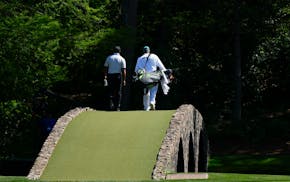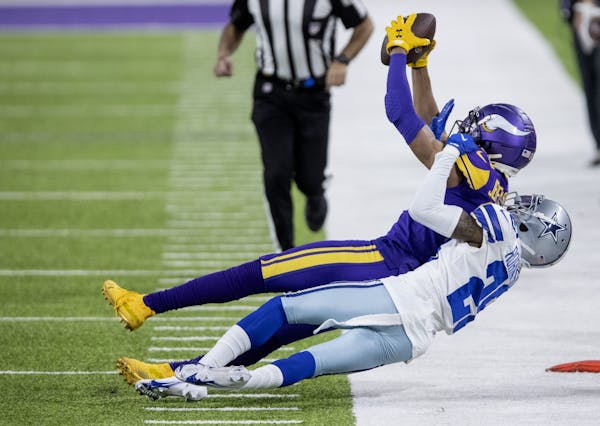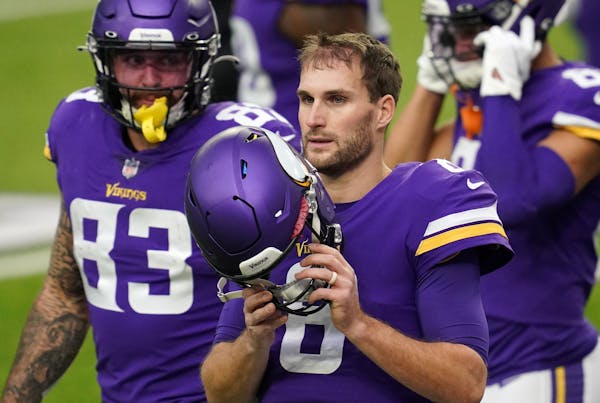Nobody asked about his health.
Nobody asked about the violent hit he had taken a few days earlier, or whether a human could sustain his current workload and continue to breathe, much less break tackles.
So Dalvin Cook cheerfully volunteered a medical update: "I feel great, everybody,'' he said. "I feel great and ready to play on Sunday. We've got the Carolina Panthers and we play Teddy Bridgewater, so look out.''
Cook spent most of his interview time answering questions about Bridgewater's return to Minnesota and the bond they formed as young Vikings who suffered knee injuries — Bridgewater's threatening his career, Cook's serious enough to delay his emergence as one of the best running backs in the NFL.
Or should we say the best healthy running back in the NFL?
Because the story of Cook's year, from contract extension through team slump through individual brilliance, is confounding.
The Panthers can commiserate.
In the 2017 NFL draft, the Panthers chose Christian McCaffrey with the eighth pick. The Vikings chose Cook with the 41st.
McCaffrey was the best back in the game last year, producing 1,387 yards rushing, 1,005 yards receiving and 19 total touchdowns. He touched the ball 403 times. He has played in only three games this year because of injuries, and his yards-per-carry average has dropped from 4.8 to 3.8 since last season. He will not play on Sunday against the Vikings.
The Panthers' reward for coaxing a brilliant season out of McCaffrey, which earned him a four-year contract extension worth about $64 million?
They went 5-11 last year and fired their coach. They are 4-7 this year.
The Vikings enter Sunday's game desperately needing to win, planning to feature Cook heavily again, and hopeful that he can prove to be one of the rare exceptions to the rule of running back usage.
In Cook's third NFL game, a 34-17 victory over Tampa Bay in 2017, he touched the ball 32 times.
From that point until late last season, he went 21 games played without touching the ball more than 28 times.
After touching the ball 33 times in a 28-24 victory at Dallas last year, he went nine games played without touching the ball 30 times again.
In the past four weeks, he has touched the ball 32 times or more three times. He has touched the ball 29 times or more in four of his past six games.
Featuring him is both logical and dangerous. He may be the Vikings' best player, and relying on him allows Mike Zimmer to play football the way he likes it — controlling the ball and the clock, making the game simple for Kirk Cousins, keeping his defense fresh.
The Vikings are 9-2 when Cook touches the ball 25 times or more. They are 6-4 when he touches it 20-24 times. They are 6-10-1 when he touches it 19 times or fewer.
Cook had a breakthrough season in 2019, then signed a five-year, $63 million extension.
Entering the season, he was considered at least a top-10 NFL running back, if not top-five. This season, he and Derrick Henry have been the league's best runners, with the Saints' Alvin Kamara replacing McCaffrey as the best running-receiving combination.
Cook is on pace to easily surpass his rushing, total-yardage and touchdown totals of a year ago, and set career highs for rushes and touches. And his team is 4-6 and needs him to be exceptional and durable to have a chance to win, even against bad teams.
There are two different ways to look at Cook's contract:
• Does he deserve it?
He puts himself at constant risk of injury as one of the most exciting players for a billion-dollar franchise in a multibillion-dollar league. In the context of sports and entertainment, of course he does.
• Is investing heavily in a running back smart?
McCaffrey's Panthers are 4-7. Ezekiel Elliott's Cowboys are 3-8. The Jets started the year with LeVeon Bell — they are 0-10 and he is now a backup in Kansas City. David Johnson's Texans are 4-7. Saquon Barkley has missed most of the season with a knee injury for the 3-7 Giants. Cook's Vikings are 4-6. Todd Gurley's former team is 7-3; his current team is 3-7.
The only current examples of an NFL team investing big money in a running back and winning while that back performs like a star are in Tennessee and New Orleans. Henry is a dominant player on a 7-3 team. Kamara is a key part of an 8-2 team.
For Cook's contract and usage to make sense, he needs to be exceptional and durable while elevating his franchise.
Watching him take a beating last week in another disheartening Vikings loss provided a reminder of just how difficult that is for even the best running backs to do.
Jim Souhan's podcast can be heard at TalkNorth.com. On Twitter: @SouhanStrib. • jsouhan@startribune.com

Souhan: Why Tiger Woods should keep swinging
Souhan: Scheffler wins Masters again, shows what makes him special
Morikawa falters in final round at Masters

Keeping up with the Joneses who helped design Augusta National's classic back nine



